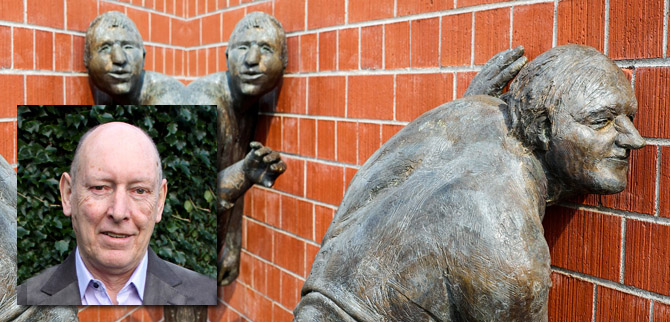Interrogations and other poems by Michael Durack
He grew up on a farm near Birdhill in County Tipperary. He was a founder member of Killaloe Writers Group and his poetry has been published in a wide range of literary journals in Ireland and abroad, as well as airing on local and national radio He is the author of a chapbook, Nothing To Write Home About (Derg House), a comic narrative in verse,A Hairy Tale Of Clare (East Clare Telecottage) and a memoir in prose and poems, Saved To Memory: Lost To View(Limerick Writers Centre.) He has collaborated with his brother, Austin on a programme of poetry and music, and together they have produced two albums, The Secret Chord (2013) and Going Gone (2015.)
https://www.facebook.com/michael.durack
Interrogations
In English class we coaxed meanings from poems,
confronted their authors, employed carrot and stick
(minus the stick) for starters. When that failed
we ate the carrot and resorted to the leather strap,
the horse-whip, the bicycle chain, the thumb screw
and sundry other instruments of torture.
But the pitch cap on Clarke’s head failed to educe
the whereabouts of the lost heifer;
electrical charges to Keats’s testiculars
elicited only the same old “Beauty is truth,
truth beauty” guff – not a syllable more;
nor did Shakespeare’s lips ope’
in response to the tightening of the rack,
to divulge the identity of The Dark Lady.
All the waterboarding in the world couldn’t persuade
Yeats to tell the dancer from the dance,
so we bade him arise and go, fuck off back
to Innisfree, and we sloped along
to the Art Room to interrogate his brother.
Killing Us Softly
(Don McLean at The Stadium)
We knew he sang a good song,
his records radiated style,
so we went to see the living minstrel,
made the N7 pilgrimage
to the National Boxing Stadium,
South Circular Road, Dublin 8.
On stage, alone, he gave us Winterwood,
or maybe it was Magdalene Lane.
Applause, another track from Tapestry
or American Pie, applause, another.
No word of greeting or acknowledgement,
just those hypnotic songs and the trailing notes
of the little Martin filling the smoky room,
until we thought he had forgotten us,
trapped in his private Castle in the Air.
And then, five songs in he paused, looked round,
and uttered a single sentence, loud and clear:
I bet many a man got a good lickin’ here!
Birdhill Station
Not Thomas’s Adlestrop where no one left and no one came;
nor Larkin’s Hull, the three-quarters-empty train gliding
to where sky and Lincolnshire and water meet.
Not the windy, weedy platform of Betjeman’s Pershore,
nobody about but a conscript saying goodbye to his love;
nor was it Montague’s rain-washed Californian station,
all legendary obstacles ranged beyond it.
Not even Abse’s Not Adlestrop, the wrong train,
and a very pretty girl leaning out, refusing his gaze.
No, this was Birdhill (Cnocán an Éinfhinn), the right train,
one-quarter full, eight-twenty, no obstacles, wending
from Thornhill to where Pollagh and Eighty-Acres meet.
And students grim as conscripts, heavy bags and hearts,
equations to solve, Wordsworth to learn; downcast eyes deflected
from willows, herbs and grass; the rocking rhythm muffling
all the birds of Lackenavea and Coolnadornory.
Spitting Images
In childhood I was a Moroney. The spit of my mother,
as the elders put it. I couldn’t see it, but I do now:
1930s snap shot, school uniform, Leeds, St Mary’s;
front row, third from right, her face my face.
My brother was a Moroney too, so like his Uncle Christy,
the handsome boy cut off in his prime 1942,
thereafter Christ’-the-lord-ha’-mercy-on-him.
Posing on scaffolding by the roof of Cragg House,
Grandfather Moroney, two workmen and a young Uncle Mick
in tradesman’s overalls. Looking at the photo for the first time,
my brother was convinced he saw himself.
Leningrad, the death throes of the Soviet Union,
where a Nevsky Prospekt street artist sketched me;
others joining in the exercise, scenting my dollars.
I left, carrying three portraits – one just so-so, one a caricature,
the third the spitting image of my brother’s face.
American Boy
Pressed to do my party piece
at the staff Christmas social.
After the mandatory protests and demurrals –
touch of a cold, frog in the throat,
out of practice, haven’t sung in yonks –
I sidle up to the microphone,
sling the guitar strap about my shoulder,
and strike a swaggering Don McLean pose,
while the genial master of ceremonies solicits
the title of my chosen song.
A long, long time ago,
but I can still remember
how Máirtín’s intro made me smile:
A cháirde, Michael Durack is going
to give us “The American Boy.”
B-Sides
Saturday school half-day 1962,
the Venetian Cafe, Pearse Street,
(missiles in Cuba – a nuclear stand-off)
killing time before the 4 o’clock bus
with Austin and his fifth-year mates.
A plate of chips, salt and vinegar,
and the American elixir, cool Coca-Cola.
Watching the juke box’s impassive claw
sift through racks of black vinyl
before the eruption of the first bassy notes
of those B-sides that we longed to hear –
Cliff and The King: Since I Lost You
and Just Tell Her Jim Said Hello.
© Michael Durack


